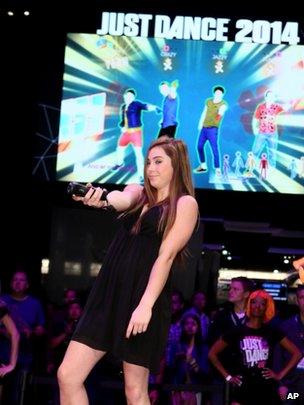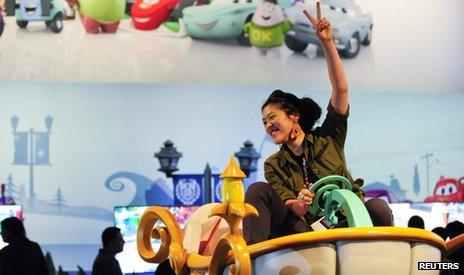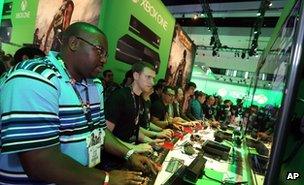E3: Will console-makers alienate hardcore gamers?
- Published
Ryan Hart on how to become a professional gamer
There are people who play video games, and then there are people like Ryan Hart.
Recognised as one of the best gamers on the planet, the 34-year-old's day-to-day life involves flying to competitions the world over - USA, Spain, Venezuela, to name a few - to take on, and usually beat, all comers.
He's here at E3 plugging his own endorsed hardware. But even outside of gaming events, such is the level of his fame, and the size of his afro, he is often approached in supermarkets and train stations, and is something of a local celebrity around his home in Croydon, London.
But could purists like Ryan - who holds the world record for most consecutive wins on Street Fighter - soon be ignored by console manufacturers?

Indie developers such as Switchblade Monkeys will continue to be allowed to self-publish - with some restrictions - on the PlayStation Network
"From my age of gaming, back in the nineties, it was a completely different deal," says Ryan, multi-tasking as he button-bashes his way through another foregone conclusion with a challenger.
"They're trying to increase their target demographic, which is respectable from a business perspective. But from a player standpoint, obviously there are going to be those areas of sacrifice where you're no longer considered in the same light as you were a decade ago."
Future generation
With the Nintendo's Wii U under-performing, the time is perhaps ripe for either Sony or Microsoft to sneak in and attract the hordes of casual gamers that drive massive profits.
But in that pursuit, they risk alienating their true fans.
"Companies like Apple and Facebook in the past few years have brought in a lot of new gamers into the industry," says Brian Blau, a gaming analyst for Gartner.
"This is potentially the future generation of the core gamer."
He says it could affect the types of games that are made to accommodate the expectations of these new users.

Most of the attendees at E3 are men, although there are some women gamers in attendance as well
"The current core gamers are associated with more violent games - shooting, bashing people in the head - and that doesn't appeal to everybody. It's mainly male, it's mainly middle-aged."
Microsoft's Xbox One has come in for the most flak among gamers at E3. The Kinect, already dismissed by many as not much more than a toy, has been seen by some here as a big distraction.
Some Xbox fans are worried that Microsoft is taking its eyes off the prize.
"It's not as much about the games anymore," says Ashley Conlon, who lives in Los Angeles.
"Here they've been focusing a lot on new games, but in the past couple of years its seemed like it's more about the features like social media, and Hulu and Netflix.
"They're trying to get everything into one package so they can touch all the markets at the same time and get people from every branch on to the systems rather than just the hardcore gamers."
She says many of her friends - all loyal Xbox fans - have considered doing the unthinkable and switching allegiances.
"I have friends who are huge Halo players - that's the only thing holding them back on the Xbox. But they're not very happy either with the way that's going."
Indie power
There may be one area of hope, however.
As well as the big blockbuster titles, independent developers were out in full force at E3.
During Sony's PlayStation event on Monday, warm applause greeted the news that indies would continue to be allowed to self-publish - with some restrictions - on the PlayStation Network.
Microsoft too has its Arcade - a marketplace for games that aren't blessed with the blockbuster budgets of Call of Duty and other titles like it.

Some people have criticised the fact that female lead characters are still uncommon in the big-name titles
"The birth of a lot of new ideas will come from this," says Yousuf Mapara, creative director of indie developer Switchblade Monkeys.
"I think Sony's press conference was the first conference like it to have indie developers on the stage, so I think that's an indication of a different direction."
He thinks the big blockbuster games - like films - will be designed to wow audiences, while indie developers will work on the the art of surprise with creative ideas and innovative game play styles.
"Both experiences are valid," Mr Mapara adds, "but it's nice to have a choice."
Female die-hards
The demographic of technology events can often be tragically stereotypical - with mostly middle-aged men parading around stands flanked by women hired to bring sex appeal to dull hardware.
At E3, the booth babes are here, but so too are the girl gamers - a legion of female die-hards who are finally starting to command as much respect as their male counterparts.

The Kinect has been seen by some Xbox fans as a big distraction
But there's still work to be done. After the Xbox and Sony events on Monday, many remarked how, once again, there were no female lead characters among the big-name titles.
"It would be nice if there was," says Ashley, with a hint of resignation in her voice.
"I think because for the gamers, when they make a strong female lead they go the sexual route - skimpy clothes! It would be good if there was some variety."
She says a change in approach could tempt her to change her buying choices with new hardware.
"Any kind of diversity is going to draw me to one platform over the other. It's much more appealing to me when people are willing to branch out."
- Published12 June 2013
- Published11 June 2013
- Published11 June 2013
- Published11 June 2013
- Published11 June 2013
- Published10 June 2013
- Published7 June 2013
- Published22 May 2013